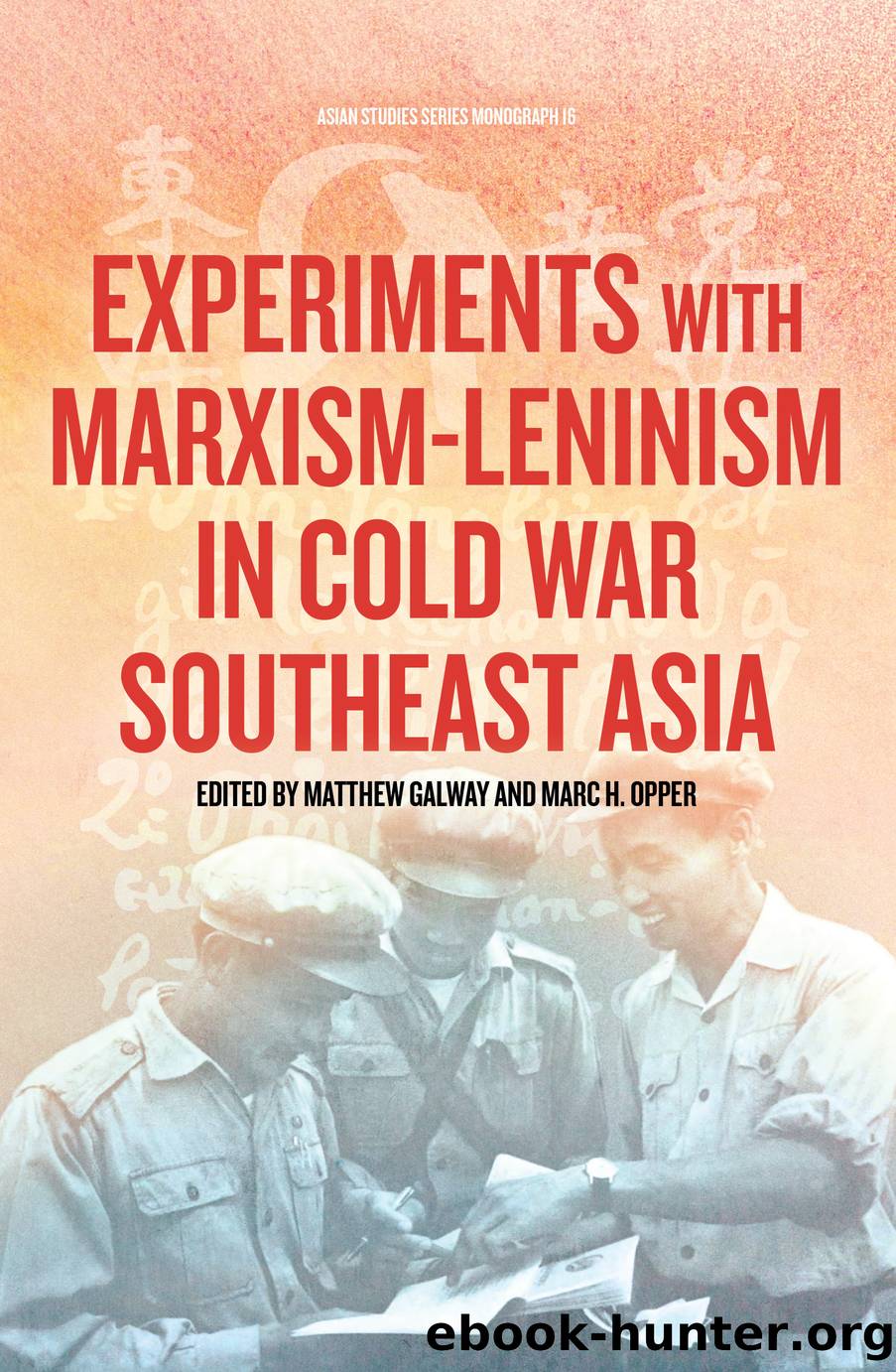Experiments with Marxism-Leninism in Cold War Southeast Asia by Matthew Galway;Marc H. Opper

Author:Matthew Galway;Marc H. Opper
Language: eng
Format: epub
Tags: Communism;Southeast Asia;Marxism-Leninism;Cold War;Maoism
Publisher: ANU Press
Published: 2022-09-20T04:41:02+00:00
PARI: A PKI reincarnation?
In his study of the Vietnamese communist movement, Christopher Goscha has explored how Vietnamese activists went to neighbouring countries to build revolutionary bases that served as a critical part of the extensive Vietnamese revolutionary network during the late colonial period. Southern China and north-eastern Thailand were ideal places for such purposes for two main reasons: first, the existence of large Vietnamese communities; and, second, their strategic locationââclose to Vietnam but ⦠just beyond the reach of the omnipresent French Sûretéâ.6 Goschaâs work demonstrates how Vietnamese revolutionaries established themselves among immigrants in Thailand and how they continued to organise anticolonial activities against the French through layered intraregional networks.7 PARIâs regional networks shared many similarities with its Vietnamese counterparts. Nevertheless, its activities went far beyond one territory. The leaders of PARIâfirst started in the Siamese (Thai) capital of Bangkok in 1927âsoon moved, along with party operations, to Singapore, Malaya, Borneo, southern China and the Philippines. PARI activists frequently penetrated Indonesia from these places, establishing contacts on both Java and the Outer Islands. Before delving into PARIâs revolutionary practices, it is essential to discuss the backdrop against which the party was founded.
Shortly after the failed PKI uprisings, in May 1927, Tan Malaka gathered with his two loyal associates, Subakat and Djamaluddin Tamin, in Bangkok. There were several reasons for choosing Bangkok as their new hideout. Apart from the fact that Siam was relatively safe because it was not a Western colony, Malaka and Tamin also knew many people in the city through their West Sumatran network.8 From his Sumatra Thawalib connections, Tamin heard that two ulamas, Sjech Taher and Sjech Ahmad Wahab, lived in the city and were sympathetic towards anticolonial struggles.9 Without much difficulty, Tamin connected with Sjech Taher, who introduced him to Sjech Ahmad Wahab, a leader of 20,000 Wahhabi Muslims in Bangkok who ran several pesantren (âIslamic boarding schoolsâ) in the city.10 Sjech Ahmad Wahab arranged accommodation for Tamin and Subakat, but they decided not to connect him to Tan Malaka for reasons of safety.
In Bangkok, the three PKI veterans finally had the chance to reflect on the partyâs failure and to analyse their situation. They concluded that, as of January 1927, the DEI Government had utterly crushed the PKI movement in the wake of the abortive revolts. According to Tamin, a Comintern document was crucial in the three PKI leadersâ discussion. Alimin brought this document from Moscow and handed it to a Singapore-based PKI member before his arrest by British police.11 The document confirmed that the Comintern regarded the PKIâs plan to rebel (the so-called Prambanan Decision) as a mistake and was opposed to what it considered a suicidal revolt. The document also reaffirmed Tan Malakaâs leadership role as a Comintern representative. Finally, the document showed only the Trotskyists supported the Prambanan Decision, while the Stalinists, who had more influence over the Comintern, opposed the plan.12
The most crucial outcomes of the discussion were two documentsâa manifesto by Tan Malaka and a statute by Subakatâwhich the three PKI fugitives used to declare the establishment of the PARI on 1 June 1927.
Download
This site does not store any files on its server. We only index and link to content provided by other sites. Please contact the content providers to delete copyright contents if any and email us, we'll remove relevant links or contents immediately.
The Secret History by Donna Tartt(18179)
The Social Justice Warrior Handbook by Lisa De Pasquale(11956)
Thirteen Reasons Why by Jay Asher(8459)
This Is How You Lose Her by Junot Diaz(6445)
Weapons of Math Destruction by Cathy O'Neil(5839)
Zero to One by Peter Thiel(5497)
Beartown by Fredrik Backman(5367)
The Myth of the Strong Leader by Archie Brown(5242)
The Fire Next Time by James Baldwin(5023)
How Democracies Die by Steven Levitsky & Daniel Ziblatt(4965)
Promise Me, Dad by Joe Biden(4910)
Stone's Rules by Roger Stone(4865)
100 Deadly Skills by Clint Emerson(4694)
A Higher Loyalty: Truth, Lies, and Leadership by James Comey(4554)
Rise and Kill First by Ronen Bergman(4547)
Secrecy World by Jake Bernstein(4392)
The David Icke Guide to the Global Conspiracy (and how to end it) by David Icke(4385)
The Farm by Tom Rob Smith(4328)
The Doomsday Machine by Daniel Ellsberg(4249)
